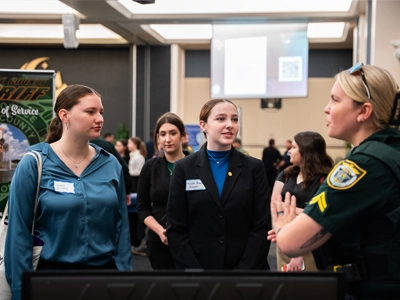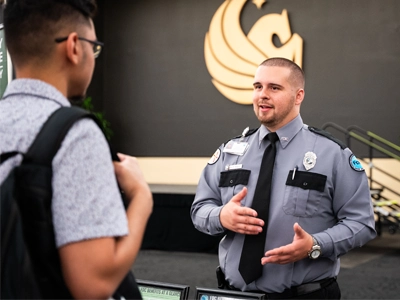No one succeeds alone in criminal justice. Success comes from collaboration, trust and having the right people by your side. Finding your team starts at UCF.
Get involved in student organizations like Lambda Alpha Epsilon and Alpha Phi Sigma, where you’ll meet like-minded peers, engage with industry professionals, and take part in events that blend leadership, service, and networking.
Take your education beyond the classroom with internships that place you inside courtrooms, law enforcement agencies, and social services organizations, giving you real-world experience before graduation.
Expand your perspective through immersive Study Abroad programs that introduce you to global criminal justice systems. And don’t miss the department’s annual Criminal Justice & Public Service Conference, where you’ll connect with professionals, explore career paths, and gain insights to shape your future.
At UCF, you won’t just study criminal justice — you’ll find your squad.
Student Organizations
As the next generation of criminal justice professionals, your personal experience plays an important role in shaping your career path. Getting involved in student organizations allows you to connect with other CJ students, network with industry professionals and explore careers within the field. In addition to making new friends, you’ll have the opportunity to participate in hands-on service projects and hear from guest speakers working in law enforcement, corrections, courts and beyond. These experiences not only deepen your understanding of the criminal justice system but can also open doors to internships and job opportunities.
Whether you’re looking to strengthen your resume, serve your community, or build a network, there’s a place for you here.
Alpha Phi Sigma Criminal Justice Honor Society
Alpha Phi Sigma is a gateway to friendships, leadership opportunities and seeing how your degree has real-world impact. This is your chance to connect with other criminal justice students who share your career goals and build relationships that last beyond college. You can also stand out by taking on a leadership role, participating in community service and attending exclusive professional development events.
As the only criminal justice honor society certified by the Association of College Honor Societies and affiliated with the Academy of Criminal Justice Sciences, Alpha Phi Sigma gives you the chance to grow academically, personally and professionally.
Ready to take the next step? To learn more and join the UCF chapter, contact faculty advisor Debra Ross or email Alpha Phi Sigma.
Criminal Justice Graduate Student Association (CJGSA)
Graduate school shouldn’t just be about your daily coursework. Build connections while gaining real-world experiences and preparing for your criminal justice career by joining the Criminal Justice Graduate Student Association (CJGSA).
As a student-led organization, CJGSA is dedicated to supporting criminal justice graduate students at UCF through research collaboration, professional development and community engagement. Members have the opportunity to network with faculty and community partners, attend workshops that enhance teaching and research skills and participate in service projects that make a positive impact in our community.
Get involved today and take full advantage of everything your graduate experience has to offer!
Lambda Alpha Epsilon
Lambda Alpha Epsilon (LAE) is a co-ed pre-professional fraternity that offers networking, career development and lifelong friendships with peers who share your passion for criminal justice. LAE’s alumni work in law enforcement, corrections, social services and even teach at the collegiate level—proving that LAE opens doors to endless possibilities.
As a member, you’ll:
- Network with Professionals: Meet guest speakers from the FBI, DEA, local law enforcement and more every other week.
- Gain Hands-On Experience: Participate in exclusive events like SWAT roundups, FBI hazmat training, and the Department of Criminal Justice’s Annual Public Service Conference and Domestic Violence Awareness Charity Auction.
- Make a Difference: Volunteer with organizations like Harbor House and Second Harvest, and support our Domestic Violence Awareness Charity Auction.
- Build Lifelong Friendships: Enjoy social events, Bigs & Littles, sports and more!
Ready to take your criminal justice journey even further? Contact LAE or email faculty advisor Iryna Malendevych.
Whether you're exploring career options, looking for the right classes, or considering internships and study abroad, our Criminal Justice advisors are here to help. Schedule a meeting to get personalized guidance, stay on track for graduation and more.
Internships
Turn your classroom knowledge into a lived experience with a criminal justice internship. An internship is one of the best ways to gain hands-on experience, build professional connections and see what a career in criminal justice is really like. At UCF, undergraduate students have the opportunity to intern with more than 100 partners, including agencies at the local, state and federal levels, as well as in private sector roles like security, social services and loss prevention.
Through your internship, you’ll apply what you’ve learned in class to real-world situations, develop practical skills and gain a deeper understanding of how criminal justice agencies operate. Many students use their internships to explore career options and some even receive job offers based on their experience.
Make an appointment with Cory Watkins, internship coordinator, to verify your eligibility for an internship and learn more about internships.

To have an internship opportunity as part of the criminal justice program and to see what opportunities there are in the field was amazing to me. That’s what...helped lead me to the opportunities I’ve had.Eric Smith ‘93, Chief of Police, City of Orlando

Internship Affiliates
Whether you’re interested in law enforcement, courts, corrections, private security, or another role, an internship can help you take the next step toward your future. Possible internship sites include:
Federal Internships
U.S. Marshals Service
U.S. Pretrial Services
Department of Homeland Security
U.S. Postal Inspection
State Internships
Florida Department of Juvenile Justice
Department of Children and Families
Florida Department of Law Enforcement
Office of Attorney General
County Internships
State Attorney's Office
Brevard/Orange/Seminole/Osceola Sheriff's Office
Public Defender’s Office
Orange/Seminole/Lake County Probation
Local Internships
Orlando Police Department
Ocoee Police Department
Prosecution Alternative for Youths
UCF Victim Services
With more than 100 established partnerships with public and private organizations across Central Florida and beyond, you can find the perfect fit to gain additional experience and on-the-job training.
FAQs
Study Abroad
Study Abroad offers an exciting opportunity for students to travel the globe while expanding their knowledge of criminal justice topics with global impacts. The Department of Criminal Justice is proud to offer Study Abroad programs that will broaden your perspective and enhance your learning of criminal justice systems, policies and practices. There are two Study Abroad programs currently available:
Human Trafficking: Exploring International Legal and Criminal Frameworks in Thailand
Dive into the complexities of human trafficking in a global context with a study abroad experience in Thailand. Human Trafficking: Exploring International Legal and Criminal Frameworks in Thailand takes you beyond the classroom, offering firsthand insight into the various forms of human trafficking and the factors that contribute to its prevalence. Through readings, site visits, discussions with experts, and cultural exploration, you’ll also gain a deeper understanding of the root cause of migration and the relationship between migration and trafficking
The program is open to students of all majors. Students interested in pursuing careers in law, criminal justice, social work, international relations, journalism, public policy and human rights advocacy will significantly benefit from the course.
This immersive experience is an opportunity to connect your studies to real-world challenges and build a global mindset for your future career. To learn more about Study Abroad in Thailand, contact the program's faculty leader Iryna Malendevych.

Comparative Policing in the United Kingdom: Exploring the Roots of Modern Law Enforcement
Discover the origins of modern policing and compare law enforcement practices between the U.S. and the U.K. in Comparative Policing in the United Kingdom. This immersive study abroad course takes you inside the British criminal justice system, exploring how historical, political, cultural and legal influences have shaped contemporary policing.
Through site visits, expert-led discussion, and firsthand experiences, you’ll examine the evolution of modern law enforcement—from the founding of the London Metropolitan Police to today’s approaches to policing, community engagement and use of force. By contrasting British and American policing styles, tactics and policies, you’ll gain a deeper understanding of global law enforcement and its impact on justice and society.
This course is a unique opportunity to step beyond the classroom, experience international criminal justice in action, and expand your perspective on policing in an interconnected world. To learn more, contact faculty leader Cory Watkins.

Annual Conference
The Criminal Justice and Public Service Conference is an opportunity to network with professionals from leading criminal justice agencies and private organizations in Central Florida and beyond. Bringing together top recruiting agencies and passionate students from all majors looking to make an impact in public service, the conference is one of UCF’s largest student-run career conferences. In addition to a career fair, students also gain insights from an inspiring keynote speaker and expert-led professional panels.
Whether you’re just starting to explore your career options or actively looking for opportunities, this conference is the perfect place to network, ask questions and take the next step in finding your dream job in criminal justice. To learn more about the conference, contact Lambda Alpha Epsilon or faculty advisor Iryna Malendevych.




